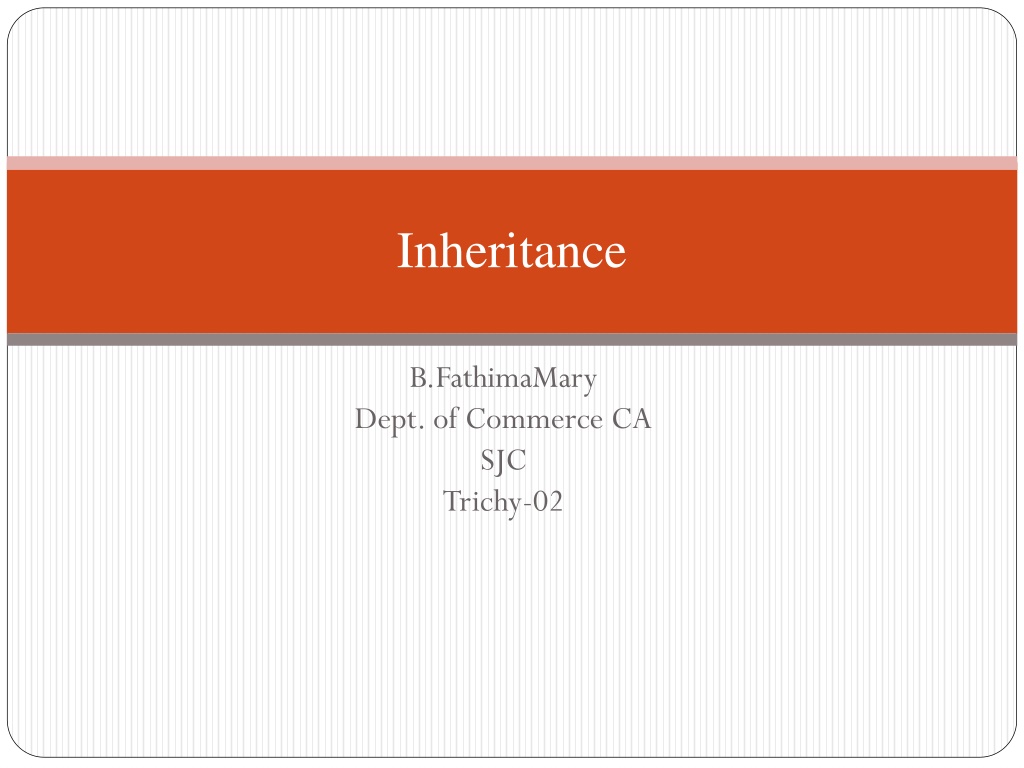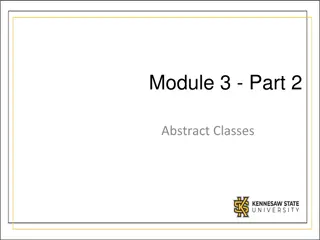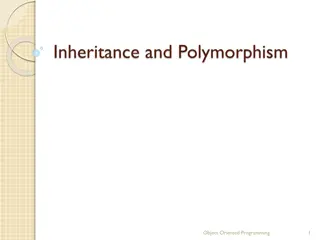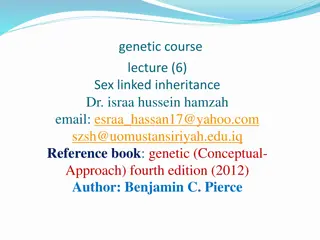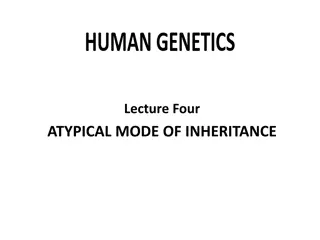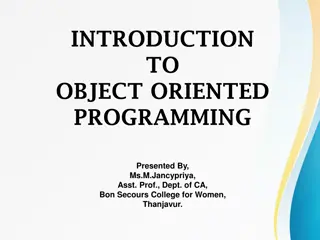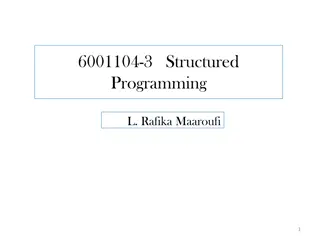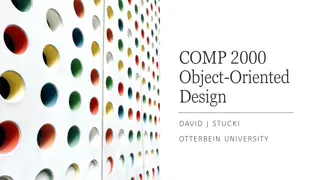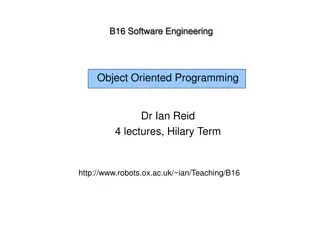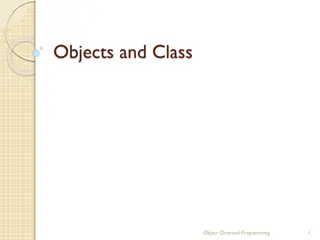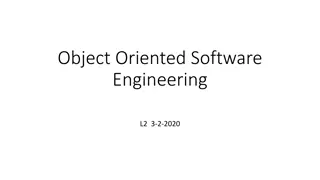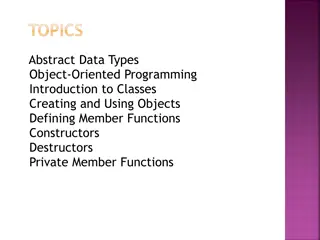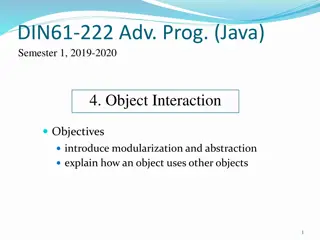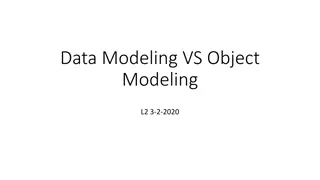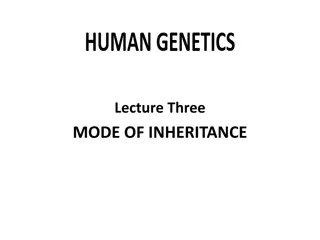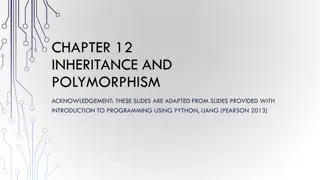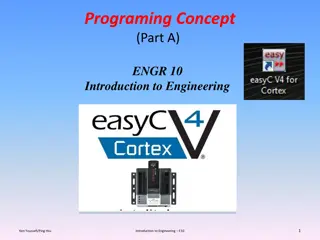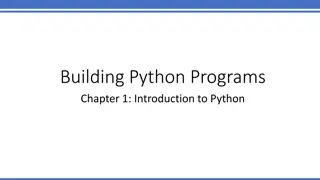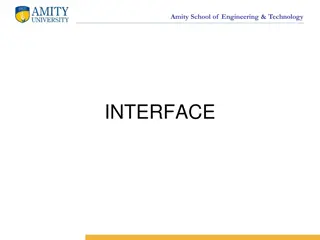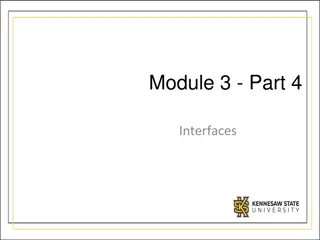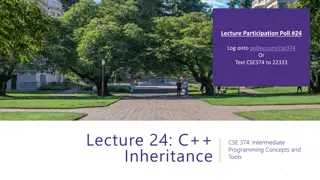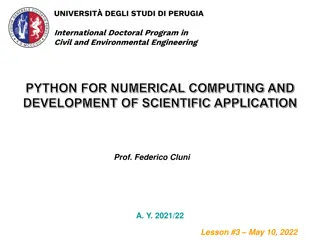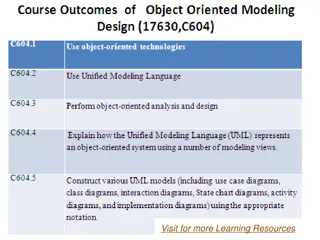Understanding Inheritance in Object-Oriented Programming
Inheritance is a fundamental concept in C++ that allows for the creation of new classes based on existing classes. This enables code reusability, organization, and the implementation of a hierarchical structure in programming. By using inheritance, developers can efficiently model relationships between different classes, leading to more maintainable and scalable codebases.
Download Presentation

Please find below an Image/Link to download the presentation.
The content on the website is provided AS IS for your information and personal use only. It may not be sold, licensed, or shared on other websites without obtaining consent from the author. Download presentation by click this link. If you encounter any issues during the download, it is possible that the publisher has removed the file from their server.
E N D
Presentation Transcript
Inheritance B.FathimaMary Dept. of Commerce CA SJC Trichy-02
What is inheritance? Inheritance is one of the key features of Object-oriented programming in C++. It allows user to create a new class (derived class) from an existing class(base class).
Why inheritance should be used? Suppose, in your game, you want three characters - a maths teacher, a footballer and a businessman. Since, all of the characters are persons, they can walk and talk. However, they also have some special skills. A maths teacher can teach maths, football and a businessman can run a business. You can individually create three classes who can walk, talk and perform their special skill as shown in the figure below. play a footballer can
Implementation of Inheritance in C++ Programming class Person { ... .. ... }; class MathsTeacher : public Person { ... .. ... }; class Footballer : public Person { .... .. ... };
Single Inheritance When a single class is derived from a single parent class, it is called Single inheritance. It is the simplest of all inheritance. For example, Animal is derived from living things Car is derived from vehicle Typist is derived from staff
Syntax of Single Inheritance Syntax of Single Inheritance class base_classname { properties; methods; }; class derived_classname : visibility_mode base_classname { properties; methods; };
class AddData { //Base Class protected: int num1, num2; public: void accept() { cout<<"\n Enter First Number : "; cin>>num1; cout<<"\n Enter Second Number : "; cin>>num2; } }; class Addition: public AddData //Class Addition Derived Class { int sum; public: void add() { sum = num1 + num2; } void display() { cout<<"\n Addition of Two Numbers : "<<sum; } }; int main() { Addition a; a.accept(); a.add(); a.display(); return 0; }
Multiple Inheritance Multiple Inheritance is a feature of C++ where a class can inherit from more than one classes. i.e one sub class is inherited from more than one base classes.
Syntax class subclass_name : access_mode base_class1, access_mode base_class2, .... { // body of subclass };
Multiple Inheritance // first base class class Vehicle { public: Vehicle() { cout << "This is a Vehicle" << endl; } }; // second base class class FourWheeler { public: FourWheeler() { cout << "This is a 4 wheeler Vehicle" << endl; } }; // sub class derived from two base classes class Car: public Vehicle, public FourWheeler { }; // main function int main() { // creating object of sub class will // invoke the constructor of base classes Car obj; return 0; }
Multilevel Inheritance Multilevel Inheritance: In this type of inheritance, a derived class is created from another derived class.
Multilevel Inheritance // base class class Vehicle { public: Vehicle() { cout << "This is a Vehicle" << endl; } }; class fourWheeler: public Vehicle { public: fourWheeler() { cout<<"Objects with 4 wheels are vehicles"<<endl; } }; // sub class derived from two base classes class Car: public fourWheeler{ public: car() { cout<<"Car has 4 Wheels"<<endl; } }; // main function int main() { //creating object of sub class will nvoke the constructor of base classes Car obj; return 0; }
Hierarchical Inheritance Hierarchical Inheritance: Hierarchical Inheritance: In this type of inheritance, more than one sub class is inherited from a single base class. i.e. more than one derived class is created from a single base class.
Hierarchical Inheritance Hierarchical Inheritance: // base class class Vehicle { public: Vehicle() { cout << "This is a Vehicle" << endl; } }; // first sub class class Car: public Vehicle { }; // second sub class class Bus: public Vehicle { }; // main function int main() { // creating object of sub class will // invoke the constructor of base class Car obj1; Bus obj2; return 0; }
Hybrid Inheritance Hybrid (Virtual) Inheritance: Hybrid Inheritance is implemented by combining more than one type of inheritance. For example: Combining Hierarchical inheritance and Below image shows the combination of hierarchical and multiple inheritance: Multiple Inheritance.
Hybrid Inheritance // base class class Vehicle { public: Vehicle() { cout << "This is a Vehicle" << endl; } }; //base class class Fare { public: Fare() { cout<<"Fare of Vehicle\n"; } };
Hybrid Inheritance // first sub class class Car: public Vehicle { }; // second sub class class Bus: public Vehicle, public Fare { }; // main function int main() { // creating object of sub class will // invoke the constructor of base class Bus obj2; return 0; }
